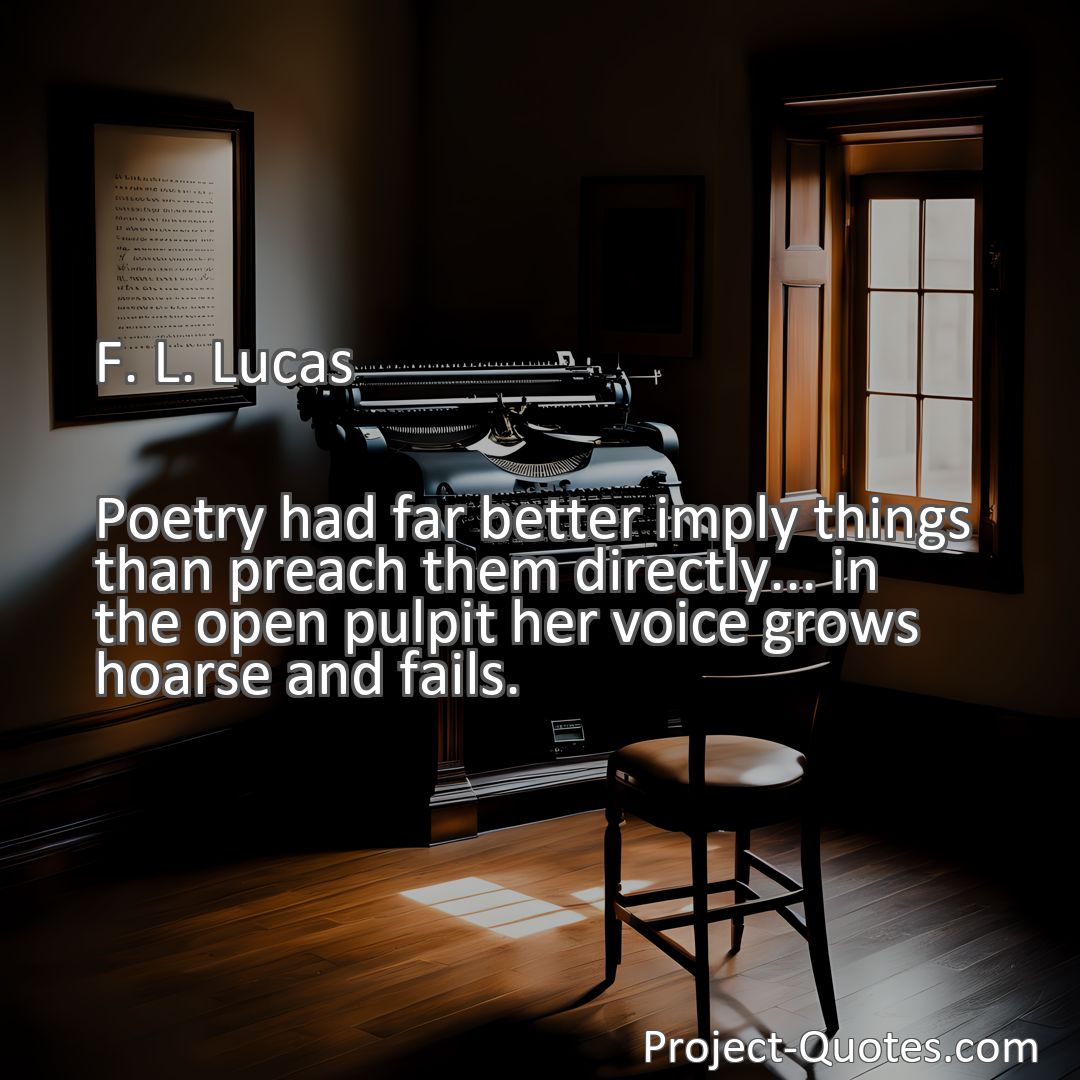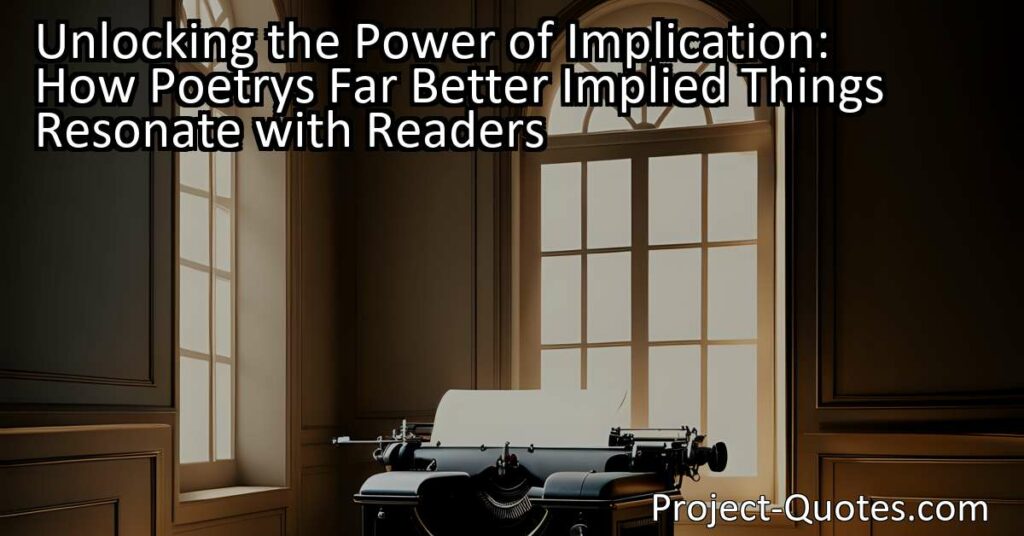Poetry had far better imply things than preach them directly… in the open pulpit her voice grows hoarse and fails.
F. L. Lucas
Poetry’s true power lies in its ability to subtly imply ideas and emotions rather than directly stating them. By embracing implication, poetry can reach a wider audience and resonate with readers on a personal level, evoking emotions, fostering empathy, and encouraging critical thinking. Its beauty lies in its ability to create a lasting impact by leaving much unsaid.
Table of Contents
- 1 Poetry had far better imply things than preach them directly… in the open pulpit her voice grows hoarse and fails.
- 2 F. L. Lucas
- 3 Meaning of Quote – Poetry had far better imply things than preach them directly… in the open pulpit her voice grows hoarse and fails.
- 4 Freely Shareable Quote Image
- 5 Related
Meaning of Quote – Poetry had far better imply things than preach them directly… in the open pulpit her voice grows hoarse and fails.
Poetry is a unique form of expression that allows the reader to explore and interpret deeper meanings and emotions. F. L. Lucas once said, “Poetry had far better imply things than preach them directly… in the open pulpit her voice grows hoarse and fails.” This quote suggests that poetry is more effective when it subtly hints at ideas rather than forcefully stating them. By embracing the power of implication, poetry can reach a wider audience and resonate with individuals on a personal level.
The beauty of poetry lies in its ability to evoke emotions and provoke thoughts through carefully chosen words and imagery. Unlike other forms of writing, such as essays or speeches, poetry tends to be more abstract and open to interpretation. It creates an artistic space where readers can actively engage with the text and derive their own meanings from it. Instead of explicitly preaching or dictating a specific message, poetry invites readers to reflect and connect with the words in a more personal and subjective manner.
Imagine standing in front of an open pulpit, delivering a sermon to a congregation. While this approach may have its merits, it often limits the effectiveness of the message. As humans, we tend to resist being preached to or told how to think or feel. This resistance often closes off our minds, preventing us from truly absorbing and appreciating the intended message. That’s where poetry comes in.
When we read a poem, we enter into a different realm, a world of imagination and emotions. We become active participants in the process, deciphering the hidden messages and uncovering the layers of meaning. For example, a simple description of a rose in a poem can imply themes of beauty, love, or even mortality. The poet doesn’t need to explicitly state these ideas; instead, they allow the readers to connect the dots and create their own interpretations.
By using implication, poetry also holds the power to transcend barriers and reach a wider audience. It allows readers to relate to the themes and emotions presented in the poem, irrespective of their backgrounds or experiences. This universality makes poetry a powerful tool for fostering empathy and understanding among individuals. When a poet subtly implies a message, it opens up the opportunity for readers to connect with their own experiences and bring their unique perspectives to the text.
One of the most significant aspects of poetry is its ability to tap into the depths of human emotions. As F. L. Lucas suggests, the voice of poetry can grow hoarse and fail if it is openly preached from a pulpit. Poetry thrives in the realm of nuance and suggestion, where emotions can be evoked without being explicitly stated. Through its use of metaphors, imagery, and other literary devices, poetry can create an intense emotional impact on the reader.
Consider the example of a love poem. Instead of directly stating “I love you,” a poet might compare their love to a delicate flower that blooms in the morning dew. This comparison enables the reader to feel the tenderness and fragility of love, without needing the concept of love to be explicitly mentioned. This indirect approach often has a stronger emotional impact, as it allows readers to draw on their own experiences and emotions, making the poem more relatable and powerful.
Moreover, by implying rather than preaching, poetry encourages readers to engage critically with the text. It prompts them to read between the lines, analyze the subtext, and uncover the layers of meaning beneath the surface. In doing so, poetry stimulates intellectual growth and fosters a deeper appreciation for language and literature. It teaches us to be active readers, constantly seeking to understand and interpret what lies beneath the poet’s carefully crafted words.
In conclusion, F. L. Lucas’s words highlight the unique power of implication in poetry. By shying away from preaching directly and instead allowing ideas to be implied, poetry can reach its full potential. Whether it is through evoking emotions, fostering empathy, or encouraging critical thinking, poetry has the ability to transcend boundaries and create a lasting impact on its readers. So next time you read a poem, dive into its implied depths, connect with your emotions, and let yourself be captivated by the beauty of what is left unsaid.
I hope this quote inspired image brings you hope and peace. Share it with someone who needs it today!


